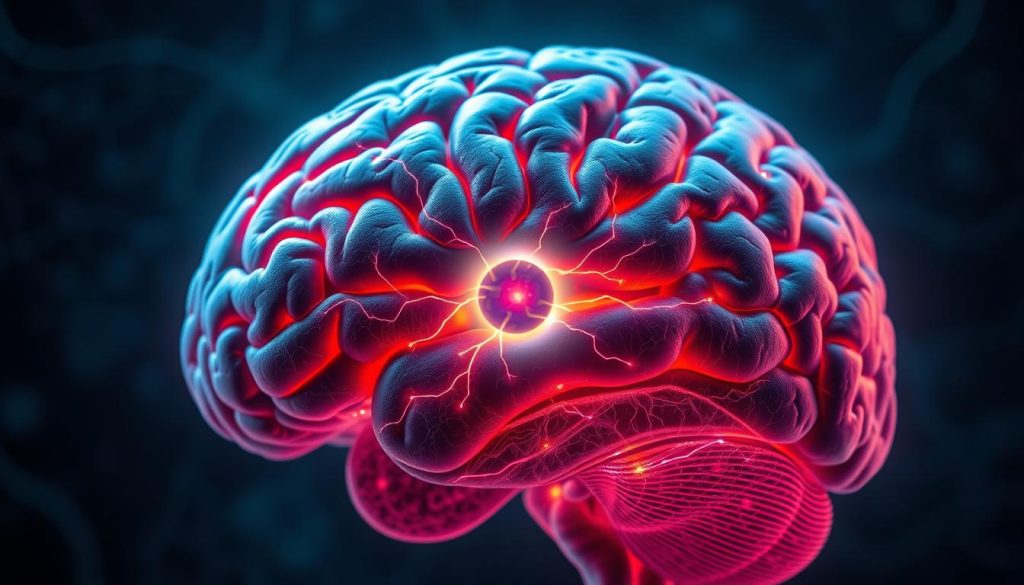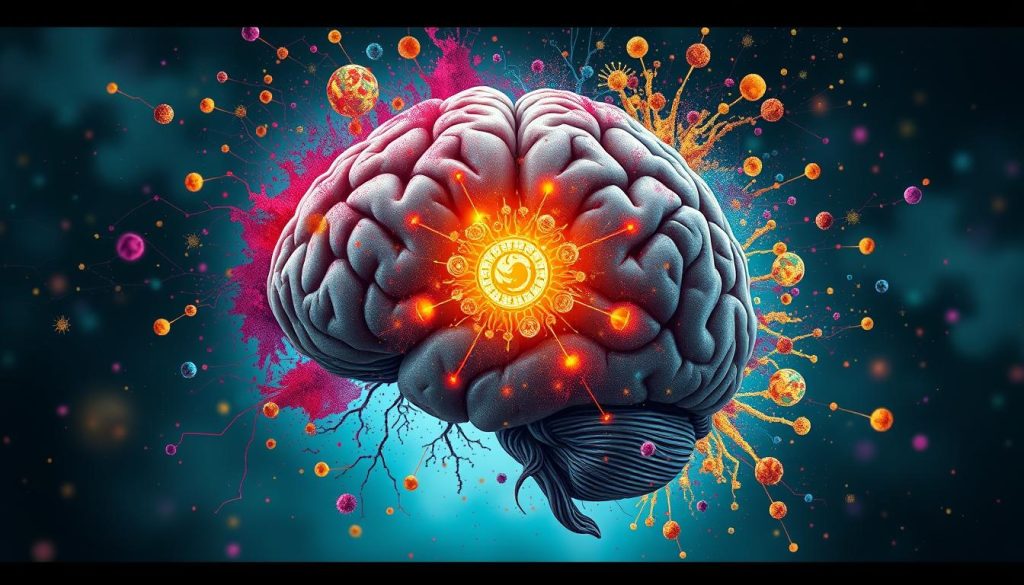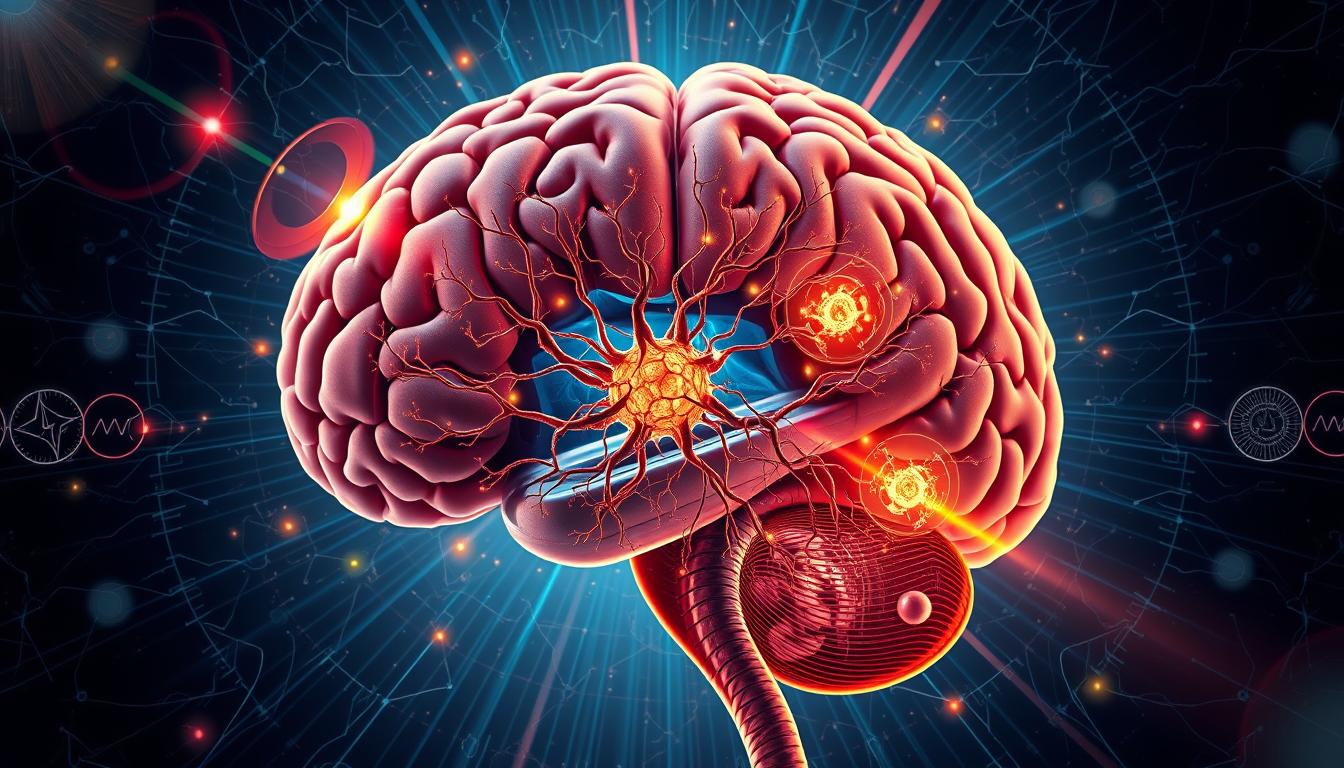Humans are closely tied to the natural world’s rhythms. Our sleep, hormone levels, and body temperature follow a 24-hour day-night cycle. This is thanks to the suprachiasmatic nucleus (SCN), a small but crucial brain part. We’ll explore how the SCN keeps our internal clock ticking and its big impact on our lives.
The SCN is a group of special cells in the hypothalamus. This area of the brain controls many body functions. Despite being tiny, the SCN is key to our circadian rhythms. These rhythms control our sleep, hormone release, and more.
The SCN’s importance goes beyond its size. It shows how life on Earth has adapted to its environment. As our planet spins, the SCN helps our bodies stay in sync with light and dark. This ensures we’re ready to use resources at the right times.
What is the Suprachiasmatic Nucleus?
The suprachiasmatic nucleus (SCN) is a small part of the brain. It’s found above the optic chiasm in the hypothalamus. This tiny area controls our internal clocks, making sure we follow a 24-hour day-night cycle.
It has about 20,000 neurons. These neurons work together to keep our body’s rhythm in sync with the day and night.
Location and Structure
The SCN is in the hypothalamus. This area helps control many body functions. Its location lets it get important light signals from our eyes.
Evolutionary Significance
The SCN’s role is key for survival and success in many species. It helps them match their internal clocks with the outside world’s 24-hour cycle. This is crucial for finding food, avoiding predators, and reproducing.
This shows how vital the SCN is. It keeps our body’s functions in harmony with our environment.

The Suprachiasmatic Nucleus: Our Biological Timekeeper
The suprachiasmatic nucleus (SCN) in our brain is key. It acts as our internal clock, controlling our body’s rhythms. These rhythms affect sleep, hormone release, body temperature, and digestion.
By matching our body’s rhythms with the outside world, the SCN keeps us healthy. It makes sure our body works well together.
The SCN makes and keeps our body’s rhythms in check. It’s like a conductor, leading our body’s systems in perfect harmony. This helps us stay in tune with day and night.
Keeping our rhythms in balance is vital for our health. The SCN ensures we sleep well, digest food right, and hormones are balanced. This helps us stay healthy and focused all day.
The SCN is a hero for our internal clock. It keeps our body and mind in sync with nature. Its work shows how amazing and flexible our brains are.
Synchronizing Circadian Rhythms
Our internal clocks, called circadian rhythms, are set by the suprachiasmatic nucleus (SCN) in our brain. This part of our brain keeps our sleep and wake times in sync with day and night.
Light and Melatonin
The SCN listens to light to control melatonin, a sleep hormone. When light hits our eyes, it tells the SCN to adjust melatonin levels. This keeps us awake during the day and sleepy at night.
Regulating Sleep-Wake Cycles
The SCN controls when we sleep and wake by managing melatonin. In the evening, melatonin goes up, telling us to sleep. In the morning, it goes down, making us feel awake and ready for the day.
This balance is key for our health. The SCN’s work keeps our circadian rhythm synchronization, light and melatonin, and sleep-wake cycle regulation in check.

Impacts of Disrupted Suprachiasmatic Nucleus Function
The brain’s internal timekeeper, the suprachiasmatic nucleus, plays a key role. When it doesn’t work right, it can cause health problems. Jet lag and shift work are two examples. They mess up our natural body clock and the outside world’s time.
Jet Lag and Circadian Rhythm Disruption
Jet lag happens when we travel across many time zones fast. It makes our body clock and local time out of sync. This can lead to sleep issues, feeling tired, and stomach problems.
Long-term jet lag can raise the risk of serious health issues. These include obesity, diabetes, and heart disease.
Shift Work and Circadian Rhythm Disruption
Shift workers, like nurses and pilots, don’t follow the usual 9-to-5 hours. This can mess up their body clock. It causes sleep problems, feeling sleepy during the day, and raises the risk of health issues.
These include metabolic disorders and some cancers.
| Condition | Potential Health Impacts |
|---|---|
| Jet Lag | Sleep problems, fatigue, digestive issues, increased risk of chronic diseases |
| Shift Work | Sleep disturbances, daytime sleepiness, increased risk of metabolic disorders and cancer |
Understanding the suprachiasmatic nucleus’s role in our body clock is key. It helps us find ways to lessen the bad effects of jet lag, shift work, and other circadian rhythm disruptions.

Advancing Our Understanding of the Suprachiasmatic Nucleus
Researchers are always trying to learn more about the suprachiasmatic nucleus. They use advanced imaging, genetic studies, and behavioral research. This helps them understand how the SCN works and how to keep it healthy.
As we learn more about our brain’s internal clock, we might find new ways to live in sync with nature. The study of the suprachiasmatic nucleus and circadian rhythms is leading to exciting discoveries. These discoveries could change how we manage our biological clocks in the future.
By studying the suprachiasmatic nucleus, we aim to improve sleep, energy, and overall health. The study of biological clocks is very promising. We can’t wait to see what new findings will come to light.

